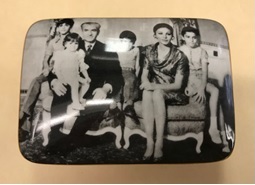As stated in an earlier blog post, members of the Maryland and Historical Collections unit at the University of Maryland libraries have been inventorying physical objects within the Spiro T. Agnew papers. One of the interesting aspects about processing a presidential or vice presidential collection is its inclusion of gifts from foreign leaders. The Spiro T. Agnew papers, for example, includes numerous gifts to the Vice President of the United States from Mohammad Rezā Pahlavi, who was the last Shah (or king) of Iran between 1941 and 1979. It is difficult to say whether this relationship extended beyond what was typical of two government officials during the Cold War, but it is clear that Agnew received gifts and commemorative literature from Pahlavi on several occasions. Increased American involvement in Iran dated to at least the early 1940s, when the United States supported England and Soviet Russia in the overthrow of Mohammad Rezā’s father, Rezā Shah Pahlavi, and replaced him with his son, Mohammad Rezā, as Shah. [1]
 The gifts which Agnew received range from the usual type that a government official might give to another government official such as a decorative vase, or books, to more personal gifts such as a ceramic jewelry box decorated with a family portrait.
The gifts which Agnew received range from the usual type that a government official might give to another government official such as a decorative vase, or books, to more personal gifts such as a ceramic jewelry box decorated with a family portrait.
In addition to the gifts, in October of 1971, Agnew – acting as the official representative of the United States, when President Nixon changed his mind about attending – went to the celebration of the 2500th year of Persian monarchy. The event occurred next to the ancient city of Persepolis where a large tent  city was constructed which occupied 160 acres of land. Other foreign dignitaries who attended the event included Prince Philip and Princess Anne of Great Britain; Emperor Haile Selassie of Ethiopia; and Prince Rainier III and Princess Grace Kelly from Monaco. As a part of the event there was a parade featuring a military display and a five hour banquet showcasing the culinary traditions of Iran. The Agnew papers contain a copy of the banquet’s menu card and a program for the parade. [2]
city was constructed which occupied 160 acres of land. Other foreign dignitaries who attended the event included Prince Philip and Princess Anne of Great Britain; Emperor Haile Selassie of Ethiopia; and Prince Rainier III and Princess Grace Kelly from Monaco. As a part of the event there was a parade featuring a military display and a five hour banquet showcasing the culinary traditions of Iran. The Agnew papers contain a copy of the banquet’s menu card and a program for the parade. [2]
 These objects are not the only items within the Spiro T. Agnew papers which relate to Agnew and Iran. The Agnew’s Personal Papers (an unprocessed series) includes files relating to Iran during the period after Agnew resigned as Vice President and became an international business consultant. The Photograph series also includes photographic prints of Agnew, his wife, Judy, and other dignitaries, during their attendance at Persepolis, some examples of which are available in the University of Maryland’s Digital Collections. Preliminary inventories of the unprocessed Memorabilia, Personal Papers, and Photograph series are available upon request. The Special Collections and University Archives at Hornbake Library also preserves the Iranian Political History Collection. All of these materials are available for researchers to explore in the Maryland Room of Hornbake Library.
These objects are not the only items within the Spiro T. Agnew papers which relate to Agnew and Iran. The Agnew’s Personal Papers (an unprocessed series) includes files relating to Iran during the period after Agnew resigned as Vice President and became an international business consultant. The Photograph series also includes photographic prints of Agnew, his wife, Judy, and other dignitaries, during their attendance at Persepolis, some examples of which are available in the University of Maryland’s Digital Collections. Preliminary inventories of the unprocessed Memorabilia, Personal Papers, and Photograph series are available upon request. The Special Collections and University Archives at Hornbake Library also preserves the Iranian Political History Collection. All of these materials are available for researchers to explore in the Maryland Room of Hornbake Library.

Dignitaries watch a reenactment
at the 2,500 year anniversary of the Persian
Empire at Persepolis. [October 1971]
[2] For more information about the 2,500 year celebration of the Persian Empire, see
https://en.wikipedia.org/wiki/2,500_year_celebration_of_the_Persian_Empire.
Mark Coulbourne is a first year MLIS student in the College of Information Studies at the University of Maryland. He is a two-year intern with the Preservation Department of the University of Maryland Libraries, and he works in the State of Maryland and Historical Collections unit at UMD’s Special Collections and University Archives.